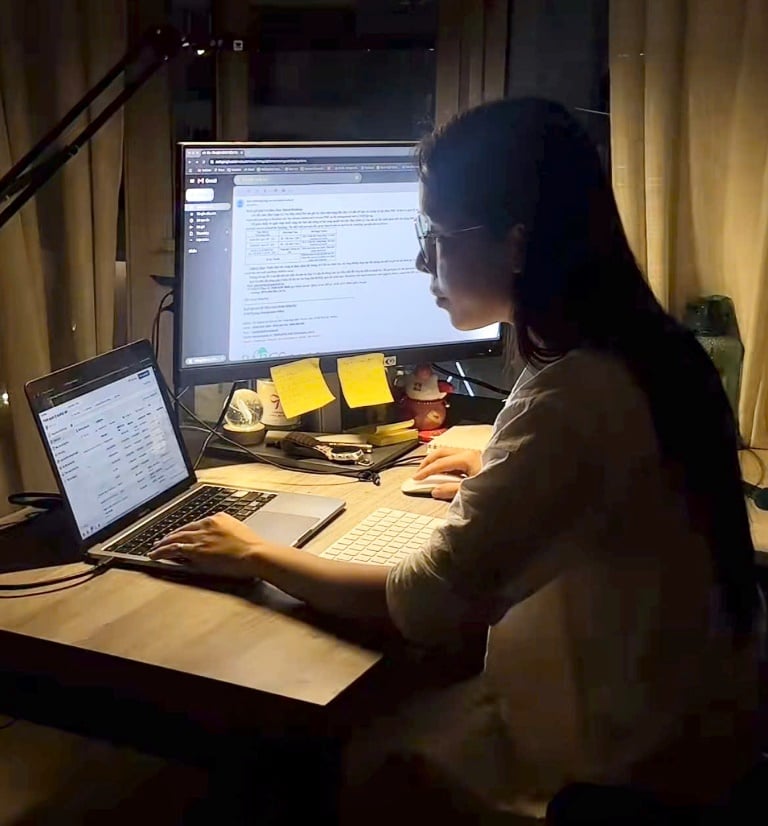Normally, people between the ages of 18 and 35 often stay up after 12am, mostly due to work, study or personal leisure activities. Specialized industries such as: Healthcare , information technology, security, industrial production, hotel and restaurant services, etc. are forced to work at night, which is unavoidable. However, the worrying thing is that more and more people are choosing a lifestyle that goes against their biological clock.
Maintaining the habit of staying up late for a long time can easily lead to circadian rhythm disorders, chronic insomnia, reduced immunity, increased risk of cardiovascular disease, diabetes, obesity; seriously affect mental health (anxiety, depression, difficulty recovering energy), gradually reducing work efficiency and quality of life.
According to many research results, one of the most obvious consequences of staying up late is sleep disorders, or prolonged lack of sleep, leading to memory loss, reduced work performance, and mental fatigue. Mr. NT (residing in Long Xuyen City, working in the field of information technology) shared: “When I first graduated and started working, due to the nature of my work, I worked all night long, every night, I slept for about 2 hours at most, and there were many sleepless nights. Partly because working late at night was more effective. To stay awake to work, I drank a lot of coffee. After a while, my health suddenly declined, and I had a severe stomach ache that required treatment. After that, I adjusted my rest and work time more reasonably, ensuring my health and working long-term.”
Illustration
The time from 11pm to 3am is the “golden time” for the liver to perform its detoxification function. If people are still active during this time, the liver cannot work effectively, causing toxins to accumulate over time, and the digestive system cannot escape the negative effects. Many studies have shown a link between lack of sleep and psychological disorders. For professions that require high alertness, such as: Medicine, driving, machine operators, etc., lack of sleep and lack of alertness can have serious consequences.
It is undeniable that staying up late sometimes helps to work more efficiently, or expand personal leisure time. But in the long run, work efficiency gradually decreases, creativity and problem-solving ability are affected. The brain is tired, reflexes are slow, decisions are inaccurate, and it is difficult to maintain a stable working performance.
Young people can proactively “minimize damage” by setting up scientific working and resting hours, ensuring both work and health. Nguyen Le Vy (living in Long Xuyen City) shared: “I often bring work home to keep up with progress. Instead of staying up late, I choose to wake up early to work. Usually, I will work more than 10 pm, then go to bed, wake up early to work at 4 am. This way, I feel alert, my work still meets the requirements, and in the long run, it does not affect my health.”
Sleep is the process of rest, helping each person's body recover completely both physically and mentally. Sleeping properly and sufficiently is the right way to live healthy, work effectively, and maintain long-term energy. To have a good night's sleep, you should limit the use of electronic devices before bedtime, avoid substances that cause insomnia, do not eat late at night; do light exercise to help the body relax easily and sleep more deeply.
People who are forced to work at night need to establish a reasonable lifestyle, such as: getting enough sleep during the day, eating on time, exercising, resting periodically to regenerate energy... Listening to your body, maintaining your natural biological rhythm, and prioritizing sleep is a wise investment in your health. If you feel prolonged insomnia, chronic fatigue, or cognitive decline, you should see a specialist for advice and early treatment to avoid the condition progressing into a serious sleep disorder.
MY LINH
Source: https://baoangiang.com.vn/he-luy-thuc-khuya-lam-viec-dem-a420365.html





































































































Comment (0)